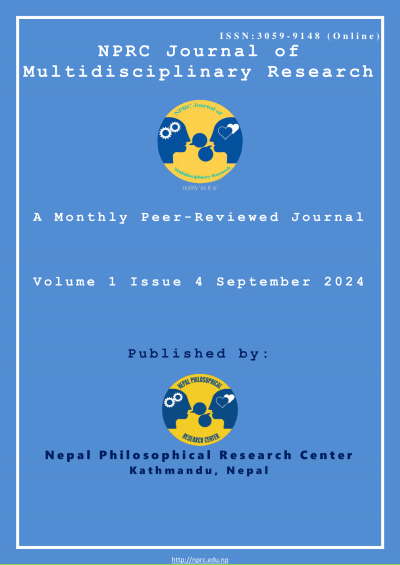Analysis of Effectiveness of Collaborative Pedagogy Practices
DOI:
https://doi.org/10.3126/nprcjmr.v1i4.70965Keywords:
Collaboration teaching-learning, Student-centered learning, Educational reform, Educational effectiveness, NepalAbstract
This study analyzes the effectiveness of collaborative teaching and learning strategies to enhance student's educational experience and learning results. Collaborative pedagogy converts the traditional teacher-centered paradigm into a more participatory, student-centered approach, promoting active participation via group work, debates, and collective problem-solving. This study examines existing literature, case studies, and empirical evidence to evaluate the impact of collaborative approaches on student accomplishment, motivation, and the development of fundamental abilities such as critical thinking, communication, and cooperation. The study found that collaborative teaching and learning approaches are essential for strengthening comprehension, increasing information retention, and cultivating superior social skills. The benefits of peer learning, active engagement, and instructor facilitation are highlighted in cultivating a dynamic classroom atmosphere. The study underscores other problems linked to implementing collaborative pedagogy, including resource constraints, dominant teacher-centered cultural norms, and substantial class sizes, especially in poor countries such as Nepal. The acceptance of collaborative pedagogy in Nepal is increasing owing to continuing educational reforms and curricular modifications; nonetheless, many obstacles hinder its extensive implementation. The document emphasizes the need for augmented teacher training, greater infrastructural support, and customized teaching methodologies to use the benefits of collaborative learning properly. The results demonstrate that, when properly implemented, collaborative teaching-learning methodology may substantially improve educational quality and prepare students to confront real-world difficulties.
Downloads
Downloads
Published
How to Cite
Issue
Section
License
Copyright (c) 2024 The Author(s)

This work is licensed under a Creative Commons Attribution-NonCommercial 4.0 International License.
This license enables reusers to distribute, remix, adapt, and build upon the material in any medium or format for noncommercial purposes only, and only so long as attribution is given to the creator.





